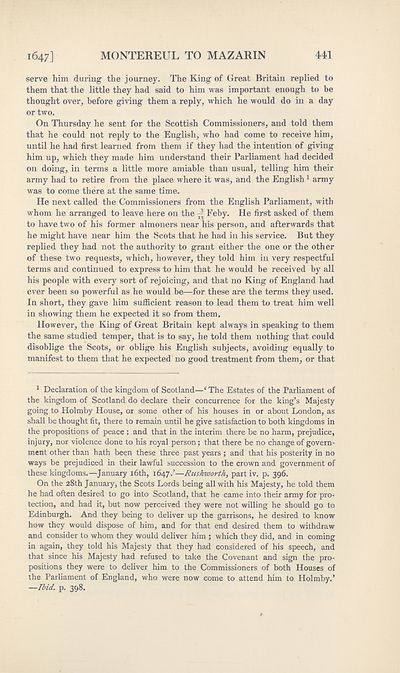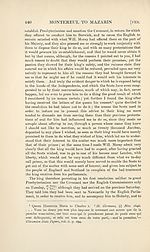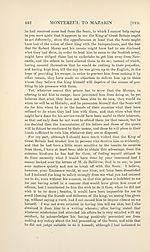Series 1 > Diplomatic correspondence of Jean de Montereul and the brothers de Bellièvre, French ambassadors in England and Scotland, 1645-48 > Volume 1
(478) Page 441
Download files
Complete book:
Individual page:
Thumbnail gallery: Grid view | List view

MONTEREUL TO MAZARIN
44-1
1647]
serve him during the journey. The King of Great Britain replied to
them that the little they had said to him was important enough to be
thought over, before giving them a reply, which he would do in a day
or two.
On Thursday he sent for the Scottish Commissioners, and told them
that he could not reply to the English, who had come to receive him,
until he had first learned from them if they had the intention of giving
him up, which they made him understand their Parliament had decided
on doing, in terms a little more amiable than usual, telling him their
army had to retire from the place where it was, and the English1 army
was to come there at the same time.
He next called the Commissioners from the English Parliament, with
whom he arranged to leave here on the ^ Feby. He first asked of them
to have two of his former almoners near his person, and afterwards that
he might have near him the Scots that he had in his service. But they
replied they had not the authority to grant either the one or the other
of these two requests, which, however, they told him in very respectful
terms and continued to express to him that he would be received by all
his people with every sort of rejoicing, and that no King of England had
ever been so powerful as he would be—for these are the terms they used.
In short, they gave him sufficient reason to lead them to treat him well
in showing them he expected it so from them.
However, the King of Great Britain kept always in speaking to them
the same studied temper, that is to say, he told them nothing that could
disoblige the Scots, or oblige his English subjects, avoiding equally to
manifest to them that he expected no good treatment from them, or that
1 Declaration of the kingdom of Scotland—‘ The Estates of the Parliament of
the kingdom of Scotland do declare their concurrence for the king’s Majesty
going to Holmby House, or some other of his houses in or about London, as
shall be thought fit, there to remain until he give satisfaction to both kingdoms in
the propositions of peace ; and that in the interim there be no harm, prejudice,
injury, nor violence done to his royal person; that there be no change of govern¬
ment other than hath been these three past years ; and that his posterity in no
ways be prejudiced in their lawful succession to the crown and government of
these kingdoms.—January 16th, 1647.’—Rushworth, part iv. p. 396.
On the 28th January, the Scots Lords being all with his Majesty, he told them
he had often desired to go into Scotland, that he came into their army for pro¬
tection, and had it, but now perceived they were not willing he should go to
Edinburgh. And they being to deliver up the garrisons, he desired to know
how they would dispose of him, and for that end desired them to withdraw
and consider to whom they would deliver him ; which they did, and in coming
in again, they told his Majesty that they had considered of his speech, and
that since his Majesty had refused to take the Covenant and sign the pro¬
positions they were to deliver him to the Commissioners of both Houses of
the Parliament of England, who were now come to attend him to Holmby.’
—Ibid. p. 398.
44-1
1647]
serve him during the journey. The King of Great Britain replied to
them that the little they had said to him was important enough to be
thought over, before giving them a reply, which he would do in a day
or two.
On Thursday he sent for the Scottish Commissioners, and told them
that he could not reply to the English, who had come to receive him,
until he had first learned from them if they had the intention of giving
him up, which they made him understand their Parliament had decided
on doing, in terms a little more amiable than usual, telling him their
army had to retire from the place where it was, and the English1 army
was to come there at the same time.
He next called the Commissioners from the English Parliament, with
whom he arranged to leave here on the ^ Feby. He first asked of them
to have two of his former almoners near his person, and afterwards that
he might have near him the Scots that he had in his service. But they
replied they had not the authority to grant either the one or the other
of these two requests, which, however, they told him in very respectful
terms and continued to express to him that he would be received by all
his people with every sort of rejoicing, and that no King of England had
ever been so powerful as he would be—for these are the terms they used.
In short, they gave him sufficient reason to lead them to treat him well
in showing them he expected it so from them.
However, the King of Great Britain kept always in speaking to them
the same studied temper, that is to say, he told them nothing that could
disoblige the Scots, or oblige his English subjects, avoiding equally to
manifest to them that he expected no good treatment from them, or that
1 Declaration of the kingdom of Scotland—‘ The Estates of the Parliament of
the kingdom of Scotland do declare their concurrence for the king’s Majesty
going to Holmby House, or some other of his houses in or about London, as
shall be thought fit, there to remain until he give satisfaction to both kingdoms in
the propositions of peace ; and that in the interim there be no harm, prejudice,
injury, nor violence done to his royal person; that there be no change of govern¬
ment other than hath been these three past years ; and that his posterity in no
ways be prejudiced in their lawful succession to the crown and government of
these kingdoms.—January 16th, 1647.’—Rushworth, part iv. p. 396.
On the 28th January, the Scots Lords being all with his Majesty, he told them
he had often desired to go into Scotland, that he came into their army for pro¬
tection, and had it, but now perceived they were not willing he should go to
Edinburgh. And they being to deliver up the garrisons, he desired to know
how they would dispose of him, and for that end desired them to withdraw
and consider to whom they would deliver him ; which they did, and in coming
in again, they told his Majesty that they had considered of his speech, and
that since his Majesty had refused to take the Covenant and sign the pro¬
positions they were to deliver him to the Commissioners of both Houses of
the Parliament of England, who were now come to attend him to Holmby.’
—Ibid. p. 398.
Set display mode to:
![]() Universal Viewer |
Universal Viewer | ![]() Mirador |
Large image | Transcription
Mirador |
Large image | Transcription
Images and transcriptions on this page, including medium image downloads, may be used under the Creative Commons Attribution 4.0 International Licence unless otherwise stated. ![]()
| Permanent URL | https://digital.nls.uk/127027185 |
|---|
| Shelfmark | SCS.SHS.29 |
|---|---|
| Attribution and copyright: |
|
| Attribution and copyright: |
|
|---|
| Description | Over 180 volumes, published by the Scottish History Society, containing original sources on Scotland's history and people. With a wide range of subjects, the books collectively cover all periods from the 12th to 20th centuries, and reflect changing trends in Scottish history. Sources are accompanied by scholarly interpretation, references and bibliographies. Volumes are usually published annually, and more digitised volumes will be added as they become available. |
|---|


